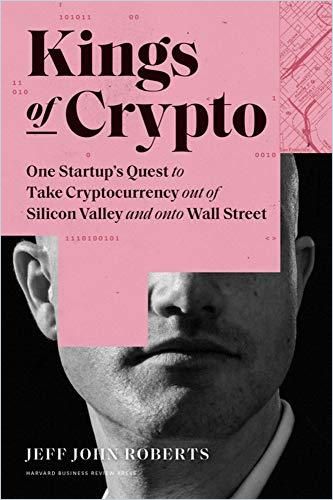Journalist Jeff John Roberts sheds some much-needed light on bitcoin via the saga of Coinbase and its founder, Brian Armstrong

Bitcoin Unraveled
Attorney and journalist Jeff John Roberts tells the backstory of how bitcoin has come to dominate financial headlines. He focuses on Coinbase, the exchange that has given the masses easy access to this arcane asset, and on its founder, Brian Armstrong. Roberts’s most impressive achievement is describing cryptocurrencies in an elegant prose that nonexperts can easily grasp.
Fortune named this one of its Best Books of 2020, and Publishers Weekly wrote of it: “Tech writer Roberts debuts with a page-turning account of the rise of [a] cryptocurrency exchange.” Computing Reviews called this “an exciting and accessible path into a new technology and how start-ups develop.”
Brian Armstrong
Roberts tells how Armstrong, living in Silicon Valley in 2009, found Satoshi Nakamoto’s paper outlining a digital currency that operated on the blockchain, beyond the purview of governments and central banks. The author depicts Armstrong’s conclusion that bitcoin could change the world. Roberts frames his story around Armstrong’s brainstorm: Coinbase – an easy way for everyone to access bitcoin.
What Brian did by creating Coinbase was remove all the complexity around addresses and private keys in the first place and let people get bitcoin in a way that resembled online banking.Jeff John Roberts
Roberts relates how Armstrong presented his idea to the venture capitalists at Y Combinator: Coinbase would manage users’ private keys, the complex passwords that stood between bitcoin owners and their stash. But bitcoin purists, Roberts reports, regarded Coinbase as anathema to their quest for decentralization. Coinbase went live in 2012 and, Robert concedes, it simplified the concept of cryptocurrency.
Criminals
Roberts cites bitcoin’s appeal in money laundering, drug dealing and extortion, because transacting parties remain secret. His example of this trend is Silk Road, the online marketplace for illegal products and services. Roberts tells how ransomware hackers would demand payment in bitcoins and how some criminals would use Coinbase to trade bitcoins for dollars.
Mt. Gox
Roberts tracks bitcoin’s skyrocketing value: In January 2013, one bitcoin was worth $13; by October, it had soared to $200, then to $500 in November and $1,000 in December.
Roberts relates that Coinbase added a sales staff to persuade merchants to accept bitcoin, and Overstock, Expedia and Dell came onboard. Roberts dissects how, in 2014, hackers burglarized bitcoin hub Mt. Gox, stealing 740,000 bitcoins worth more than $500 million. By early 2015, bitcoin’s price had fallen to $200.
The plain truth was that bitcoin was too slow and expensive to catch on with retailers as a practical replacement for cash or credit cardsJeff John Roberts
Coinbase, Roberts reports, hoped consumers would use bitcoin for everyday purchases, allowing the company to take a percentage of every transaction, but that didn’t happen. So, the author says, Armstrong launched a professional trading platform for deep-pocketed investors, collecting commissions of 0.25% per trade.
Gold
Bitcoin, Roberts makes clear, never gained traction for everyday payments, because blockchain clearing proved too sluggish. But Roberts wants readers to understand bitcoin’s appeal as a store of value that competes with gold.
In the case of bitcoin, Satoshi’s creation had failed to upend central banks and the credit card industry, but it had emerged as a bona fide rival to gold.Jeff John Roberts
Roberts discloses that, as Armstrong brought on new investors, he kept tight control of Coinbase. Aping the founders of Facebook and Google, Armstrong created supervoting shares that allowed him to dominate any shareholder votes, even if he did not hold a majority of Coinbase stock. Armstrong became a billionaire.
The Internal Revenue Service
Bitcoin turned into a favored tool, Roberts relates, for tax evaders. The IRS determined that between 2012 and 2015, only 802 US taxpayers claimed gains or losses from bitcoin. Roberts details how the IRS subpoenaed personally identifying information about Coinbase’s 500,000 customers.
Coinbase at first refused to comply, but, Roberts divulges, it later compromised by surrendering records on 13,000 of his biggest clients and issuing 1099-K forms to customers.
Frenzy
Roberts describes how, in 2017, initial coin offerings (ICOs) took off, and he points to one, for a digital token called Brave, that raised $35 million in 30 seconds. In South Korea, he reports, working-class people were buying bitcoins and, in Tokyo, consumers were purchasing cryptocurrencies in brick-and-mortar shops. Roberts quotes enthusiasts calling the new money “altcoins,” though detractors referred to them as “shitcoins.”
The number and size of ICOs defied logic. Staggering sums changed hands every day.Jeff John Roberts
Roberts explains that, as the frenzy continued unabated, the US Securities and Exchange Commission began looking at ICOs more closely and deemed that the coins were securities that required government oversight. Meanwhile, bitcoin’s value went from $1,000 in early 2017 to $16,000 by December.
Roberts notes that, though the bitcoin network remained too slow and clunky to turn the cryptocurrency into everyday money, Coinbase nonetheless took in more than $1 billion in revenue in 2017, and the enterprise’s valuation reached $1.6 billion. And by 2019, even the most outspoken critics were embracing the blockchain technology. Roberts cites how JPMorgan Chase CEO Jamie Dimon – who had once termed cryptocurrencies a “fraud” – signed off on JPM Coin, a digital currency for cross-border transactions.
Clarity
Roberts does the seemingly impossible: He makes bitcoin’s function, marketing, value and utility crystal clear. If at times he delves too deeply into complex digital technologies, Roberts makes up for it with concise, memorable explanations of bitcoin arcana. That alone – never mind Roberts’s gift for vivid storytelling and the flamboyance of his main protagonist – makes this required reading for anyone holding cryptocurrencies or considering acquiring them. Economists, investors, students, professors and those seeking to comprehend the forces driving today’s global economy will revel in Roberts’s reportage.
Compelling works on cryptocurrencies and blockchains include Out of the Ether by Matthew Leising, The Infinite Machine by Camila Russo and Blockchain Wars by Evan McFarland.





